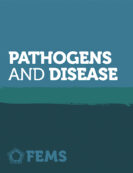FEMS Microbiology Ecology Poster Prize Winner: Olivia Bulka
We send our congratulations to Olivia Bulka, who won one of the Poster Prizes sponsored by FEMS Microbiology Ecology at Dehalocon 2021.
 The Third International Conference on Anaerobic Biological Dehalogenation (Dehalocon 2021) was held in Italy between 27-30 September 2021.
The Third International Conference on Anaerobic Biological Dehalogenation (Dehalocon 2021) was held in Italy between 27-30 September 2021.
Read our interview with Olivia about her research below:
What is your current position, and what was your scientific journey to get there?
I’m currently pursuing my PhD in Chemical Engineering at BioZone, which is part of the University of Toronto. Here, I study the metabolism of microbial communities used for bioremediation of chlorinated environmental pollutants, co-supervised by Profs Elizabeth Edwards and Krishna Mahadevan. I started my PhD here after completing my Bachelor’s in Microbiology and Immunology at the University of British Columbia.”
Could you describe the research your poster covered?
I presented the results of recent work characterizing a mixed microbial enrichment culture that can degrade dichloromethane (or DCM). DCM is a toxic compound that contaminates groundwater sites around the world, but is degradable by certain microbes. These microbes can be employed for site remediation though a process called bioaugmentation.
In my work, I created a DCM-degrading enrichment culture, and performed DNA and metabolite analysis to determine the culture’s metabolic products and predict which organisms within the culture may be involved in DCM degradation. Understanding DCM-degraders is important for their application in DCM bioremediation and thus the overall improvement of contaminated sites in the future.”
What do you hope to focus your research on in the future?
I’d like to stay involved in environmental microbiology and biotechnology. Microbial communities are such an interesting and flexible tool that can be harnessed to solve a number of environmental issues, from bioremediation to biomining to bio-based materials, so I hope to continue my work in this field!”
–
We use income from the FEMS Journals to fund grants, awards, and projects, and to support our knowledge sharing events and initiatives. Consider publishing your research with our journals to help the global microbiology community.
All but one of the FEMS journals are now fully open access (OA), with one journal, FEMS Microbiology Letters remaining a subscription journal with free-to-publish and OA options. Open access is key to supporting the FEMS mission of disseminating high quality research as widely as possible: when high quality, peer reviewed sound science is open access, anyone, anywhere in the world with an internet connection, can read it.







